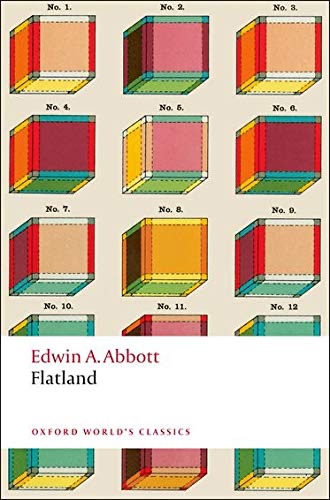

I came to this odd little gem via Carl Sagan’s Cosmos TV series. In an episode of that superb series Sagan uses an apple – gleefully slicing and printing circular sections, rather poorly, with it – to illustrate Abbot’s ideas on how one might begin to think extra-dimensionally.
A clergyman and teacher, Abbot’s Flatland is a modern philosophical/religious parable. As an atheist, I felt that I might find this troublesome. But, to my mind at least, Abbot’s ideas tap deeper roots than mere allegories for Christian religion (such as C. S. Lewis’ Narnia series, which don’t). As a philosophical nugget, this tiny book packs a powerful punch, reminding us – like Hume’s Dialogue & History of Natural Religion that – if we take ourselves as the measure of everything, we’re likely to severely miscalculate in many important areas. I’m not sure what Abbott would make of my reading of his work, but I find it stimulates my mind rather towards scientific paradigm shifts, like the cosmological re-orderings of Copernicus and Galileo, or Darwin’s fundamental rewriting of the history of life on earth, than religious ones.
It’s tricky territory, and, rather like the pervasive fogs that fill Flatland, it can be hard to keep the bigger philosophical ideas that lurk here in focus. On one level (which of Abbot’s levels this might correspond to I can’t be sure) this can be read as a Victorian appeal to retain a religious sense of ‘our place’ in ‘creation’, but on another, and to my mind deeper (or more dimensional) level, it’s also a thought experiment concerning how humans are stuck in the matrix of their own physical/mental modes of perception, and that’s an exciting area for thought.
There’s a point in the book (the pun’s unavoidable), where the Sphere shows the Square a view of Pointland, where there are no dimensions, in which a single consciousness buzzes continuously to itself: able only to perceive itself, all else is merely an aspect of it’s self. The square and the sphere are horrified by the introspective solipsism of the point*, the Sphere sternly declaiming, somewhat contradictorily: “Behold yon miserable creature… mark his perfect self-contentment, and hence learn this lesson… to be self-contented is to be vile and ignorant… to aspire is better than to be blindly and impotently happy”. This passage puts contemporary aspirations to contentment, which most if not all of us no doubt pursue in much of our lives, however ineffectually, in an interesting light.
A very short but stimulating and pleasurable read, highly recommended.
* to misuse an art historical term, such pointillism brings to mind the horrific cognitive aberration that is that is Postodernism (‘there is nothing outside the text’!), a mode of ‘thinking’ that is ultimately, irony of ironies, utterly pointless.
